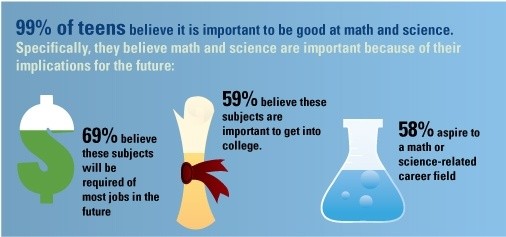Intel Survey of Teens Intends to Spark Debate about Math and Science Confidence Versus Performance
NEWS HIGHLIGHTS
- A vast majority of American teens are confident in their own math and science abilities, but they generally agree there is a math and science crisis in the United States, suggesting they may not feel personally responsible for the problem.
- Teens primarily attribute poor confidence in the United States' math and science abilities to a lack of work ethic and discipline, not a lack of school funding or resources.
- Those surveyed understand that math and science are important to their futures and they expressed interest in these subjects, indicating that poor performance on international assessments is not a result of apathy or lack of interest.
SANTA CLARA, Calif., Nov. 10, 2010 - Despite high personal confidence in math and science, American teenagers are not confident in their country's ability to compete in these subjects, a new survey released today suggests. The findings reveal that teens, as individuals, may not feel a part of what they acknowledge is a math and science problem plaguing the country -- a problem illustrated by the United States' poor performance on global rankings.

The teens surveyed primarily attributed their minimal confidence in our national math and science abilities to a lack of hard work and discipline, but not a lack of school funding or resources. This may suggest they need to be challenged more in the classroom. Yet, the silver lining is that, contrary to perceptions that American teenagers are apathetic about math and science, students highly value the importance of these subjects and understand the role of math and science to their futures.
This survey of 1,000 American teens was commissioned by Intel Corporation to offer a student perspective on the complex issues facing American education today and to spark a debate about how best to challenge American teens to excel in math and science. Intel, as the sponsor of two of the world's largest, most prestigious pre-college science competitions, recognizes math and science as critical foundations for innovation.
[img]2[/img]
Shelly Esque, vice president of Intel's Corporate Affairs Group, said: "These findings raise a lot of questions. Are teens overconfident? Or is it that they are not being challenged enough? At Intel, we believe teens are telling us we need to raise the bar for American students through world-class education standards in every state. And that we need innovative programs that celebrate not just "making the grade," but taking the challenging courses that will prepare our students for the careers of the future."
[img]3[/img]
The Results:
American teens understand the importance of math and science education.
99 percent of teens believe it is important to be good at math and science.
58 percent aspire to pursue a math- or science-related career.
Despite ranking 21st out of 30 in science and 25th out of 30 in math literacy1 among students from developed countries, 85 percent of American teens are confident in their own math and science abilities.
Despite high personal confidence, American teens are not confident in the United States' ability to compete in math and science.
When asked which country is best at math and science today, 90 percent selected a choice other than the United States, with 67 percent choosing Japan or China.
American teens primarily blame a lack of work ethic and discipline as reasons why other countries are ahead of the United States in math and science.
51 percent of teens who are not confident in the United States' math and science abilities believe this is because Americans do not work hard enough.
44 percent of those who do not think the United States is the best at math and science blame a lack of discipline.
Just a third of teens blame lack of funding or school emphasis for poor math and science abilities in the United States.
This survey of U.S. teenagers was conducted online between Sept. 24 and 28, 2010 by Penn Schoen Berland on behalf of Intel. Participants included 1,000 teenagers ages 13 to 18. Demographics were aligned as closely as possible to U.S. Census data. The margin of error is +/- 3.1 percent.
The Intel Education Initiative
Over the past decade alone, Intel has invested over $1 billion and Intel employees have donated close to 3 million hours toward improving education in more than 60 countries. To learn more, visit www.intel.com/newsroom/education. To join Intel's community of people sharing their stories with the hope of becoming a catalyst for action and a voice for change in global education, visit www.inspiredbyeducation.com. To view ongoing updates, join the Facebook group at www.facebook.com/InspiredByEducation and follow Twitter updates at www.twitter.com/intelinspire.
Last updated: Apr 7, 2020 at 12:03 pm CDT

 United States: Find other tech and computer products like this over at
United States: Find other tech and computer products like this over at  United Kingdom: Find other tech and computer products like this over at
United Kingdom: Find other tech and computer products like this over at  Australia: Find other tech and computer products like this over at
Australia: Find other tech and computer products like this over at  Canada: Find other tech and computer products like this over at
Canada: Find other tech and computer products like this over at  Deutschland: Finde andere Technik- und Computerprodukte wie dieses auf
Deutschland: Finde andere Technik- und Computerprodukte wie dieses auf